Here is a positive feature recently published in the Daily Record, Dairy farms moo-sic to her ears, written by Bobby Warren. A city girl fell in love with dairy cattle and decided to pursue her dreams despite her urban upbringing. Here is an excerpt from this exciting story…
 Despite being a “city girl” while growing up in Worthington, Dianne Shoemaker fell in love with dairy cows, and it led to her studying dairy science, becoming a dairy farmer and a dairy education specialist.
Despite being a “city girl” while growing up in Worthington, Dianne Shoemaker fell in love with dairy cows, and it led to her studying dairy science, becoming a dairy farmer and a dairy education specialist.
As a child, Dianne Shoemaker remembers her parents taking the family to her grandparents’ in Wisconsin. Shoemaker grew up in Worthington, a suburb of Columbus, but loved looking at the dairy cows grazing in pastures along the roadways between Ohio and Wisconsin. Those fond memories of the dairy farms, barns and cows has turned into a career for Shoemaker, who recently joined Ohio State University’s Wayne County Extension Office as a dairy specialist.
While dairy is her profession, it is also her life. She and her husband, Steve, milk 170 head on their Mahoning County farm, where they have a mix of Jerseys and Holsteins. Despite being a city girl, her father told her if she wanted to study dairy, then she should study dairy. So, off she went to The Ohio State University and pursued a degree. (Photo courtesy Daily Record)

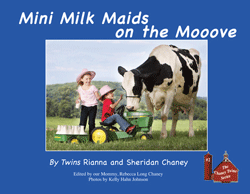 If you’re looking for a Christmas present for your kids then how about one that showcases the dairy industry?
If you’re looking for a Christmas present for your kids then how about one that showcases the dairy industry? A class action, antitrust lawsuit has been filed on behalf of Northeast dairy farmers against the
A class action, antitrust lawsuit has been filed on behalf of Northeast dairy farmers against the  Dairy Markets Week in Review
Dairy Markets Week in Review Dairy producers, through
Dairy producers, through 
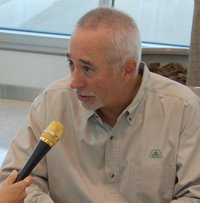
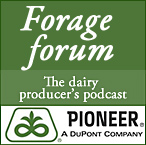 Dr. Bill Mahanna, nutritional sciences manager for
Dr. Bill Mahanna, nutritional sciences manager for 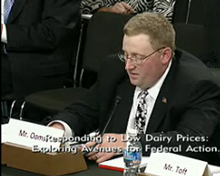 Eric Ooms, a producer from New York, told the panel that while there is industry support for a national pricing solution, producers in his area are against eliminating differentials. “ANY plans that recommend eliminating or lowering the Class 1 differentials should be viewed very skeptically, if not outrightly opposed,” Ooms said emphatically. “With growing emphasis on the importance of regional food systems and local foods, it seems obvious to me that to steer federal policy away from Class 1 differentials is counterproductive.”
Eric Ooms, a producer from New York, told the panel that while there is industry support for a national pricing solution, producers in his area are against eliminating differentials. “ANY plans that recommend eliminating or lowering the Class 1 differentials should be viewed very skeptically, if not outrightly opposed,” Ooms said emphatically. “With growing emphasis on the importance of regional food systems and local foods, it seems obvious to me that to steer federal policy away from Class 1 differentials is counterproductive.”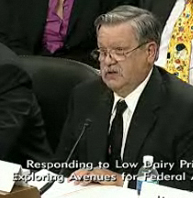 Producer Paul Toft from Wisconsin, testifying on behalf of the Associated Milk Producers Inc. (AMPI), noted the importance of maintaining the Milk Income Loss Contract (MILC) and the Dairy Product Price Support Program. “Unfortunately, the MILC program by itself is not sufficient,” Toft said. “The price dairy farmers are receiving for their milk is still below the cost of production. They have been losing thousands of dollars a month, even with the MILC program assistance.” He says that AMPI is supporting the concept of dairy price
Producer Paul Toft from Wisconsin, testifying on behalf of the Associated Milk Producers Inc. (AMPI), noted the importance of maintaining the Milk Income Loss Contract (MILC) and the Dairy Product Price Support Program. “Unfortunately, the MILC program by itself is not sufficient,” Toft said. “The price dairy farmers are receiving for their milk is still below the cost of production. They have been losing thousands of dollars a month, even with the MILC program assistance.” He says that AMPI is supporting the concept of dairy price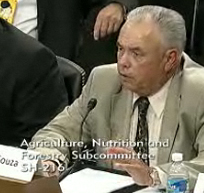 Ray Souza of California, president of Western United Dairymen, said the situation for family dairy farmers in his state is dire. For the short term, Souza says WUD recommends USDA buy more cheese to donate to food banks. “I come from an area where some counties have 15% to 16% unemployment. The food banks there sure could use that cheese,” he said. Long term, he says WUD endorses the supply management proposal known as the Holstein Association Dairy Price Stabilization Plan.
Ray Souza of California, president of Western United Dairymen, said the situation for family dairy farmers in his state is dire. For the short term, Souza says WUD recommends USDA buy more cheese to donate to food banks. “I come from an area where some counties have 15% to 16% unemployment. The food banks there sure could use that cheese,” he said. Long term, he says WUD endorses the supply management proposal known as the Holstein Association Dairy Price Stabilization Plan.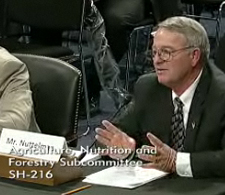 Doug Nuttelman, a dairy farmer from Nebraska, says the the current economic situation has “redefined dairying.” As a member of the National Milk Producers Federation (NMPF) board of directors, Nuttleman presented a plan that would involve a new approach to dairy policy, including revamping of the federal Milk Marketing Order program and discontinuing the Dairy Product Price Support Program, as well as instituting a dairy insurance program. “As a farmer, I participate in my crop insurance program,” he told the panel. “I’d like to see some type of margin-type program for my dairy.”
Doug Nuttelman, a dairy farmer from Nebraska, says the the current economic situation has “redefined dairying.” As a member of the National Milk Producers Federation (NMPF) board of directors, Nuttleman presented a plan that would involve a new approach to dairy policy, including revamping of the federal Milk Marketing Order program and discontinuing the Dairy Product Price Support Program, as well as instituting a dairy insurance program. “As a farmer, I participate in my crop insurance program,” he told the panel. “I’d like to see some type of margin-type program for my dairy.”
 Fresh Market Editor Matthew Enis with Supermarket News dives into the
Fresh Market Editor Matthew Enis with Supermarket News dives into the